‘The wind of change’: decolonisation in British West Africa
Published in 20th-century / Contemporary History, Features, Issue 4 (Jul/Aug 2006), Volume 14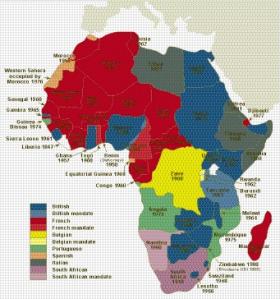 ‘The wind of change is blowing through this continent and, whether we like it or not, this growth of national consciousness is a political fact. We must all accept it as a fact, and our national policies must take account of it.’
‘The wind of change is blowing through this continent and, whether we like it or not, this growth of national consciousness is a political fact. We must all accept it as a fact, and our national policies must take account of it.’
British Prime Minister Harold Macmillan’s speech to the South African houses of parliament on 3 February 1960 has become firmly associated with the process of decolonisation in British Africa. Macmillan’s speech, however, had first been delivered almost unnoticed to an audience in Accra, the capital of independent Ghana, only a few days previously. If in South Africa he attempted to explain the future of Britain in Africa to an apprehensive audience, in Accra his speech was delivered to a nation already free from colonial rule. Ghana, formerly known as the Gold Coast, had been one of Britain’s greatest successes in Africa. Economically strong and politically relatively well developed, it provided an obvious starting-point for the implementation of reform on the continent of Africa.
Britain readjusted its approach to one of ‘partnership’ after World War II
Although independent Ghana would prove an inspiration to Africans, whether under British, French, Belgian, Portuguese or Afrikaner rule, their own march to freedom was heavily dependent on London and the colonial authorities. From the years immediately preceding the Second World War, British colonial policy came to react more perceptibly to the political, social and economic demands emanating from Africa, but also to activity elsewhere in the empire and to the weight of international events. It had become clear to some British analysts that changes were necessary in order to maintain their influence in Africa. The system of ‘indirect rule’, by which authority was wielded through local chiefs and rulers, had by 1939 become somewhat restrictive as African needs and demands evolved.
In December of that year one Lord Hailey, who had produced the encyclopaedic African Survey in 1938, was asked by the Colonial Office to undertake an extended tour of Britain’s African colonies. His travels produced the 1941 report Native administration and political development in British Tropical Africa, which questioned whether the colonial authorities could expect the continuation of ‘that degree of acquiescence in our rule which is a necessary condition of administrative progress’. Hailey believed that Britain should readjust its approach to one of ‘partnership’, giving the colonial peoples a greater say in their economic and social development.
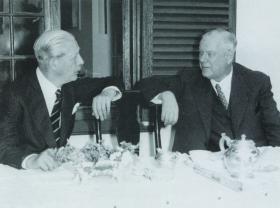
British prime minister Harold Macmillan in conversation with South African prime minister Hendrick Frensch Verwoerd in the course of his 1960 tour of Africa. (Macmillan Archives)
While these influences became more pronounced in London, in the African colonies themselves the war had a significant effect on colonial administration. New demands were placed on the African populations to service ports and airfields and to increase production of raw materials, and there was a large increase in African service in the armed forces. While the war led to unprecedented levels of integration between the African and British economies, shortages also encouraged the development of self-sufficiency and a degree of economic independence. These pressures, and the new thinking within the administration, created increasing room for reformers such as Andrew Cohen (who later became head of the African division of the Colonial Office) to influence future policy.
To both coloniser and colonised it became obvious that the war had accelerated the need for a further redefinition of the basis of political collaboration. London responded by developing ideas that quickly overtook those contained in Hailey’s influential document. Between 1942 and 1943, African members were appointed to administrative councils in Nigeria, the Gold Coast and Sierra Leone. In the latter year the Elliott Commission produced a report that stated that ‘somewhere in West Africa within a century, within half a century, a new African State will be born’. From Hailey’s proposal to concede political advances once the majority had developed sufficient political consciousness, policy became centred on more consistent development, affording concessions first to the African élites before spreading them slowly to the lower strata of society. British thinking focused on securing their continued influence by ensuring that it was they who shaped the colonies’ political and economic futures. When Alan Burns was appointed governor of the Gold Coast in 1941, he believed that any anti-British resentment was ‘due to the policy of deferring concessions until it is too late for them to be appreciated by the people’.
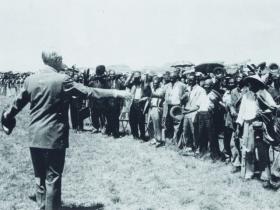
Macmillan visits Basutoland (later to become independent Lesotho) on his 1960 tour. (Hulton Picture Company)
Discontent in the Gold Coast
In spite of their concessions, it was clear that the Colonial Office envisaged a slow and deliberate process towards independence spread over a long period of time. Indeed, in the immediate post-war period, the degree of investment in developing the British colonies was such that one commentator, R. F. Holland, has described it as ‘the heyday of African empire’. The policy of ‘new colonialism’, developing grand new projects and investing further in African economies, had a great impact on the African populations. The growing encroachment into their ordinary lives, coupled with the increased development engendered by investment, served only to raise levels of discontent. In the Gold Coast, post-war opposition to the colonial administration was fanned by controls on foreign trade, limitations to educational advance and the hard-line approach of the administration to the problem of swollen shoot disease that hit the territory’s most important export, cocoa.
In spite of this simmering discontent, opposition had not yet developed into a coherent call for independence. The United Gold Coast Convention (UGCC) party was founded in 1947 to provide a political focus for African grievances, yet its membership was based predominantly around professional men and merchants from coastal towns. In keeping with the general direction of British policy, it was the authorities themselves who initiated significant change. In 1946 new constitutions were introduced in both the Gold Coast and Nigeria that again increased African representation. The degree of change, however, was tailored to suit the individual colony. The Gold Coast was seen as politically and economically more advanced than its neighbours and was thus afforded greater concessions.
While the British learned from their experience of decolonisation in Asia, as India became independent in 1947 and the other Asian colonies followed suit, it was from within British West Africa itself that the impetus for the next phase of reform arose. In the Gold Coast, as we have seen, the post-war political and economic situation had increased African discontent. By late 1947 this agitation had become particularly directed against a group of European traders known as the Association of West African Merchants. Early the following year, disillusionment became increasingly visible on the streets. A protest called by an ex-servicemen’s association on 28 February 1948 became a rallying point for those disillusioned with the administration. As the crowds reached Christianborg Castle, the colonial governor’s residence, they were fired on by police. In the ensuing three days of panic and riots, 29 people were killed and 237 injured. Although hardly an event to rival the greatest upheavals in the British Empire, it was to be of great significance for the future of the Gold Coast. Amid rumours of a communist plot, several nationalist leaders were arrested, including Kwame Nkrumah, then general secretary of the UGCC and future president of independent Ghana. The men became heroes during their imprisonment, martyrs created by the authorities’ hasty response.
It was, however, the investigation into the riots that proved most significant for the future of the territory. From this eventually emerged the Henley Coussey Commission, led by a prominent African lawyer of that name, whose recommendations, which included a new constitution based on new democratic procedures and greater representation for Africans at all levels, formed the basis of the future colonial approach. While they made these concessions, it was obvious that the British desired to retain strict control over the future of the Gold Coast, and in autumn 1949 Sir Charles Arden-Clarke was appointed governor of the territory. He had gained considerable experience in the disturbances in British South-East Asia and came with the explicit concern to maintain control over the security of his new territory.
The increasingly radical nature of nationalist politics had provided further impetus for his appointment. In June 1949 Nkrumah split with the UGCC to form his own Convention People’s Party (CPP). Its approach, dismissive of the Coussey reforms as ‘bogus and fraudulent’, was based around a more dramatic call for ‘Self-government—NOW’. In January 1950 Nkrumah launched a campaign of ‘positive action’ in pursuit of his goals. Although it proved a failure, the arrest of Nkrumah and other prominent CPP members served only to increase their popularity. In the 1951 election they were resounding victors, and Arden-Clarke, who believed that Nkrumah represented the only opportunity to bridge the gap between progressive African goals and the colonial approach, released the CPP leader from prison to become ‘Leader of government business’.
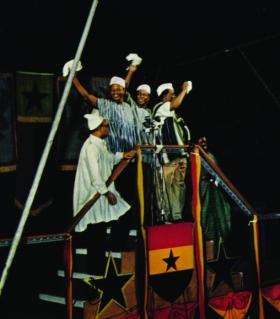
President Kwame Nkrumah (right) celebrates Ghanaian independence at the Polo Grounds, Accra, in March 1957.
Impact on Nigeria
Events in the Gold Coast had a significant impact elsewhere in West Africa. While the authorities in Accra led the way, their counterparts in Nigeria were determined not to be left behind. Governor Sir John Macpherson and Chief Secretary Sir Hugh Foot seized the initiative in direct response to the 1948 riots in Accra by announcing an almost immediate review of the 1946 constitution through nationwide consultative forums. They dealt strictly with agitation of a similar nature within their own territory in November 1949, when an industrial dispute at Enugu colliery saw police open fire and shoot 21 miners. The authorities’ ability to contain the effects of this incident illustrated two prominent features of colonial Nigeria: the tight control commanded by the authorities, and the lack of a Nigeria-wide nationalist movement able to capitalise on the incident’s potential. The authorities continued to remain a step ahead of nationalist demands and in 1951 they introduced a new, more liberal constitution, named after the governor, which followed the advances made in the Gold Coast.
In response to their experiences in Africa and Asia, and to the extension of the Cold War, the British began to further refine their thinking on the future of their African colonies. Eager to maintain their influence, they analysed the use of different avenues, such as the Commonwealth, as alternative futures for Africa. It soon became apparent that self-rule in Africa was becoming a closer target. The opportunities that these advances afforded were embraced with open arms in the Gold Coast by the CPP. Nkrumah pressed for faster moves to self-government and was granted extensive concessions in the 1954 constitution, which severely limited the position of the governor. The election that followed was again won by the CPP, who were by now engaged in an ambitious programme of social and economic reform. They used their position to tackle difficult social grievances, such as the swollen shoot issue, head-on, and won British admiration for the professional and democratic nature of their approach. By July 1956 Nkrumah felt confident enough to dissolve the assembly and contest a general election against a newly formed opposition party, the National Liberation Movement (NLM), which had been created to protect Asante interests against perceived CPP encroachment. Although they captured only 57 per cent of the votes cast, the CPP emerged victorious with a majority of seats and what they perceived as a strengthened mandate from the people.
It was enough to persuade the colonial authorities that the state was ready for independence. In British eyes, the Gold Coast had proved itself to be more than capable of self-governance, and ahead in many ways of the rest of British Africa. The colonial authorities were also aware that the course they had embarked on could not be stopped without the use of force. This was an eventuality they were eager to avoid after their experiences in Malaya and in Kenya, where the rebellion of Kikuyu tribesmen known as Mau Mau continued to cause them difficulty. There, the brutal British suppression had led to public outcry at home and severe criticism of the colonial authorities, centred particularly around activities in the Hola detention camp. Confident in the ability of their successors, and eager to avoid a repeat of these events in their prized West African territory, the British made the decision to grant the Gold Coast independence. On 6 March 1957, to the sound of celebrations across the continent of Africa, the territory became independent under the title of an ancient West African kingdom: Ghana.
Nigerian politics regional rather than national
The increasing pace of change in the Gold Coast again resonated directly in Nigeria. The 1954 constitution, which replaced that created only three years earlier, made moves towards greater representation and emphasised the federal approach, which had become central to British concerns for the colony’s future. Created by the Royal Niger Company between 1885 and 1889, the artificial boundaries of Nigeria encompassed over 250 ethnic minorities. In administration, the territory had been divided roughly between the three most dominant groups: the Hausa/Fulani Muslims of the North, the Yoruba of the West and the Igbos of the East. Indirect rule had favoured the Muslim emirs in the north, and the new system continued to look upon them as ‘more favourably disposed to [Britain] than the Southern Nigerians’. In accordance with these structures, politics among the African population was organised predominantly along regional rather than national lines. The North was dominated by the Northern People’s Congress, the West by the Action Group, and the East by Nnamdi Azikiwe, while central politics operated on an often uneasy balance of their individual interests.
With an eye on events in Accra, and following the not insignificant milestone of Sudanese independence on 1 January 1956, the concerns of the colonial authorities centred around reconciling these regional divisions with the creation of a stable, unified Nigeria. Overcoming this difficulty was foremost in the minds of those who assembled at the constitutional conference in London in May 1957. Aided by an increased willingness on the part of the Northern Muslims to waive their opposition to a secular central state, the British were by that stage anxious to complete the move to independence. They appointed a commission to test minority grievances, which reported in 1958 that ‘Nigeria means to follow the road of liberal democracy and parliamentary government’. The findings convinced the British that they could conceivably quicken the pace of political freedom without risking violent consequences, although the bloody civil war that followed independence, between 1967 and 1970, eventually proved them wrong. In 1960, however, buoyed by Macmillan’s speech and the move to African independence across the continent, such a situation was not envisaged, or at least not publicly expressed, and the British joined the Nigerians in a celebration of their independence on 1 October of that year, with the federal system intact.
Changing perception of Britain’s world role post-Suez
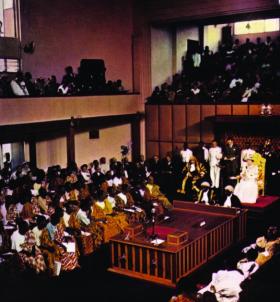
The duchess of Kent presides over the official handing over of power in the Ghanaian parliament, 6 March 1957.
The acceleration of change in West Africa was caused not only by the British strategy of adapting their approach to suit individual African regions and states but also by the changing perception of Britain’s world role. After he replaced Sir Anthony Eden as prime minister in January 1957, the Conservative Harold Macmillan concentrated his energies on restoring relations with the United States, which had been damaged by the Suez crisis that had precipitated Eden’s resignation. He also desired to restore British prestige in the Commonwealth, and redirected British economic attention towards the emerging European market, particularly after the creation of the European Economic Community in 1957.
The Cold War and the rapid technological advances that followed—particularly in nuclear power—redefined the role of empire as a test of world power. British concern over the extension of Soviet and Chinese power directed further attention towards the creation of stable democratic states in the post-independence years. In the Gold Coast such fears had led to claims of a communist plot in the 1948 Accra riots, repeated in Nigeria a year later. Allied to their experience in Palestine, India, Egypt, Cyprus and Malaya, not to mention Kenya, the Cold War also convinced the British of the need to avoid violent confrontation. Even after a state had been granted independence, it was more than conceivable that a lack of preparation could lead to problems such as those that surfaced in Nigeria later in the 1960s.
Post-1960 events in the former Belgian Congo, where great power involvement augmented a brutal and lengthy civil war that even a United Nations peace-keeping force found itself powerless to stop, could only have strengthened British resolve to ensure the future stability of and their influence over their former colonies. Macmillan’s colonial secretary, Iain Macleod, later opined that any policy other than independence ‘would have led to terrible bloodshed in Africa . . . The march of men towards freedom can be guided but not halted’.
Ghanaian independence itself, in particular Kwame Nkrumah’s writings and speeches on pan-Africanism, but also its early political and economic successes, had a profound effect throughout Africa. In 1958, buoyed by Ghana’s example, Guinea voted to secede from France, and survived by the goodwill of Ghana and other African states after the French withdrew all aid. In West Africa it soon became evident that since Ghana and Nigeria had become independent there would be no attempt to maintain control over the other British colonies in Sierra Leone and the Gambia. By 1964, the ‘wind of change’ that blew first in the western part of the continent had crossed to central and eastern Africa, and seen Kenya, Tanganyika (now united with Zanzibar as Tanzania), Northern Rhodesia (Zambia), Nyasaland (Malawi) and Uganda all gain their independence.
Summing up
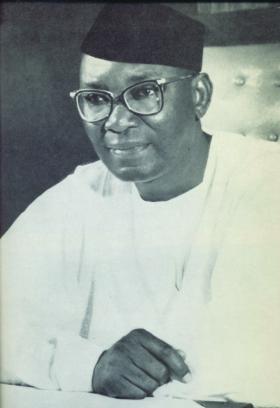
The first president of independent Nigeria, Dr Nnamdi Azikiwe.
The difference between the East and Central African experiences of decolonisation, with their significant and vocal settler communities, however, highlights the difficulties for the historian in interpreting decolonisation in British Africa. The ever-changing nature of British policy makes it difficult to attribute decolonisation to one major factor. In the immediate post-war period, for example, it appeared that the British were strengthening their ties with empire, yet by 1960 they had granted independence to two of their most prized colonies: the Gold Coast and Nigeria. If at times it appeared that British policy was a response to its concerns at the changing international environment and to mould African opinion, such an approach had to be responsive at least to some extent to African demands. We have seen that nationalist successes in Ghana and Nigeria could provide an inspiration to other African states. Britain’s broader colonial experience in dealing with these nationalists—not least, perhaps, the Indian experience—was important when dealing with the divided ethnicities in Nigeria. Global concerns of power politics, the Cold War and economics also influenced and adjusted British priorities at crucial times and in crucial ways during the decolonisation process. Some writers have further suggested that independence marked not the end of empire but its continuation by alternative means: through the Commonwealth, aid, or the continued dominance by British and international companies of the ‘independent’ economies.
It is most important, therefore, when analysing African decolonisation not to look at it in isolation from its world and pan-African influences. The case of British decolonisation in West Africa provides a good example of the effect of these competing factors, albeit without the significant white settler influence so crucial in East and Central Africa. As the forerunner of British decolonisation in Africa it provided Britain with a natural testing ground for its policies and one strong enough and important enough to provide it with transferable lessons. Having begun with the words of Harold Macmillan, it is perhaps apt to return to an earlier speech made in the year following Ghanaian independence to a group of British officials in Singapore. ‘Having lost our pre-eminence in material strength’, he told them, ‘we had to learn to exert our influence in other ways. Once more we should be living by our wits, as we had in earlier periods of history.’
Kevin O’Sullivan is a postgraduate student in the Department of History, Trinity College, Dublin, and holds a Government of Ireland Research Scholarship from the Irish Research Council for the Humanities and Social Sciences.
Further reading:
J.D. Hargreaves, Decolonisation in Africa (2nd edn, London, 1996).
M. Meredith, The state of Africa: a history of fifty years of independence (London, 2005).
N.J. White, Decolonisation: the British experience since 1945 (London, 1999).
H.S. Wilson, African decolonisation (London, 1994).
















